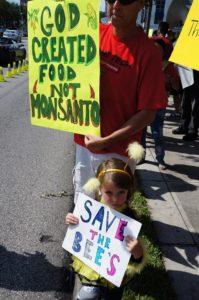 Despite the rain that pushed through the Houston area this past weekend, a good many folks still turned out for the local March Against Monsanto – an event replicated in 47 states, 50 countries and 500 cities around the globe. Up in St. Louis, hundreds demonstrated at the front door of Monsanto headquarters.
Despite the rain that pushed through the Houston area this past weekend, a good many folks still turned out for the local March Against Monsanto – an event replicated in 47 states, 50 countries and 500 cities around the globe. Up in St. Louis, hundreds demonstrated at the front door of Monsanto headquarters.
Events like these are important. They help draw attention to the issues. They bring together, motivate and inspire like-minded souls.
But no single event will ever be sufficient to bring about the kind of changes we need for the sake of our health and that of the planet. It takes ongoing effort – emailing, calling, lobbying and more – to generate enough pressure to spur our political representatives to action or compel the big corporations to change how they conduct their business.
Yes, this is more time consuming and not quite as exciting as direct action, but it’s what makes the prospect of change both more realistic and probable.
Case in point: Walmart’s recent efforts towards greater sustainability. As The Daily Green notes,
It’s one of those great paradoxes, where a company synonymous for cheap products sold in a suburban big box can transform some markets for the better, creating incentives for the many manufacturers that need Walmart to survive to decrease packaging, increase energy efficiency or take other strides.
This isn’t because corporate leaders had a change of heart. It took years of intense public criticism of and resistance to the retail behemoth on a variety of issues, including the environment and sustainability.
Issues have to be kept alive. And we’re the ones to do it.
This means first keeping abreast of the issues. There are lots of great websites and blogs out there on food, nutrition, the environment and holistic health, and we’re sure you have your favorite “go-to” sites for such info. One of our favorite starting points is the Organic Consumers Association. Their site is consistently updated with news stories and calls to action from a wide variety of sources.
Another way of staying informed is by getting involved with one or more nonprofit organizations working on food and related issues of environment and sustainability. There’s a good list of both national and regional organizations here to get you started.
While some of the larger non-profits routinely put out specific calls-to-action and even provide pre-written emails you can customize and send through their website, you can also contact elected officials and government agencies at any time on matters of food, health and environment.
Your correspondence doesn’t need to be long or complicated. Short and pointed, in fact, may be more powerful. Just start by saying why you’re writing, then explain what you want them to do about the issue(s) you’re concerned about. Be polite and specific. Ask for a response. You may only get a form reply, but at least you will know that your position has been heard.
All the contact info you’ll need is available through usa.gov, but if you’re not sure who your current representatives are, there are other search tools that can help you:
To find your state representatives here in Texas, use this search tool. Most states have similar tools, so if you’re outside of Texas, just Google “find my state representatives” (without the quote marks) and the name of your state of residence.
The main thing is to not do nothing. Doing nothing – just accepting what the politicians and corporations think is best for us (which typically means what’s best for their own bottom lines) – is exactly how we wound up with such a messed-up food environment. Doing something is the only thing that will get us out of the mess.